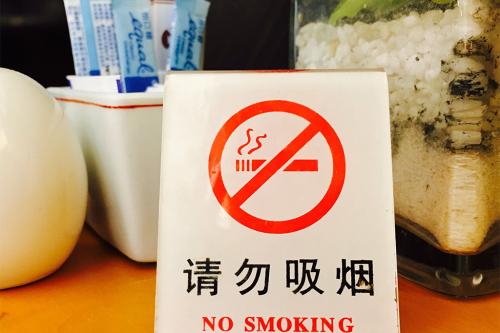UN reports more people warned against tobacco use, but industry interference continues
Despite measures protecting a majority of people from tobacco-related illness and death, the tobacco industry continues to hamper Government efforts to fully implement life and cost-saving interventions, the United Nations health agency reported on Jul 19.

More people warned against tobacco use.
“One-third of countries have comprehensive systems to monitor tobacco use. While this is up from one-quarter of countries monitoring tobacco use at recommended levels in 2007, Governments still need to do more to prioritize or finance this area of work,” according to the UN World Health Organization’s WHO report on the global tobacco epidemic, which was launched on side-lines of the UN High-level political forum on sustainable development in New York on Jul 19.
The report shows that some 4.7 billion people – more than 60 per cent of the population – are protected by at least one “best practice” tobacco control measure from the WHO’s Framework Convention on Tobacco Control (WHO FCTC). These measures include no smoking areas and bans on advertising tobacco products, for example.
In the foreword to the report, the head of WHO urged Governments to incorporate all the provisions of the WHO FCTC into their national tobacco control programmes and policies, and to fight against the illicit tobacco trade.
“Working together, countries can prevent millions of people from dying each year from preventable tobacco-related illness, and save billions of dollars a year in avoidable health-care expenditures and productivity losses,” said Tedros Adhanom Ghebreyesus, WHO Director-General.
The report, funded by Bloomberg Philanthropies, noted that systematic monitoring of tobacco industry interference in government policymaking protects public health by shedding light on tobacco industry tactics.
Such tactics include “exaggerating the economic importance of the tobacco industry, discrediting proven science and using litigation to intimidate governments.”
Douglas Bettcher, director of WHO’s Department for the Prevention of Noncommunicable Diseases (NCDs), said tobacco industry interference in government policy making represents “a deadly barrier to advancing health and development in many countries.
Controlling tobacco use is a key part of the 2030 Agenda for Sustainable Development. The Agenda includes targets to strengthen national implementation of the WHO FCTC and a one-third reduction in premature deaths from NCDs, including heart and lung diseases, cancer and diabetes, according to a press release launching the report.
“The progress that’s been made worldwide – and documented throughout this report – shows that it is possible for countries to turn the tide,” said Michael R. Bloomberg, WHO Global Ambassador for Noncommunicable Diseases and founder of Bloomberg Philanthropies.
Source:United Nations
- 223 reads
Human Rights
Ringing FOWPAL’s Peace Bell for the World:Nobel Peace Prize Laureates’ Visions and Actions

Protecting the World’s Cultural Diversity for a Sustainable Future

The Peace Bell Resonates at the 27th Eurasian Economic Summit

Declaration of World Day of the Power of Hope Endorsed by People in 158 Nations

Puppet Show I International Friendship Day 2020

